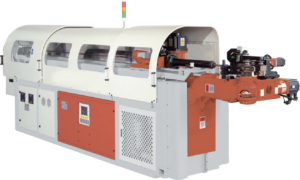In the world of industrial metalworking, precision and safety go hand in hand. Whether you’re bending tubes for HVAC systems, automobile parts, or custom furniture, an Alpine Tube Bender can get the job done efficiently—if you know how to use it properly. This is where the User Manual for Alpine Tube Benders becomes indispensable.
In this blog, we explain why having the manual is crucial, what it includes, and how it can improve everything from production quality to workplace safety.
Why Every Operator Needs the User Manual
Even experienced technicians can forget minor but crucial steps when switching between machines or returning after time away. A user manual:
-
Provides Standard Operating Procedures (SOPs)
-
Serves as a Troubleshooting Guide
-
Ensures Machine-Specific Accuracy
-
Improves Longevity of Equipment
Instead of relying on memory or word-of-mouth training, a manual creates a consistent and repeatable workflow.
What’s Inside the User Manual for Alpine Tube Benders
1. Machine Specifications
Detailed technical specs such as:
-
Bending capacity (diameter and wall thickness)
-
Power requirements
-
Machine dimensions and weight
-
Recommended tooling
Understanding your machine’s limits ensures you don’t overload or misuse it.
2. Controls and Indicators
This section explains the functionality of:
-
Control buttons and knobs
-
Digital display (CNC models)
-
Error message indicators
-
Jogging and homing buttons
It’s especially useful when training new operators or troubleshooting unfamiliar alerts.
Safety Guidelines and Warnings
The manual highlights all potential hazards and safe handling practices. You’ll find information on:
-
Emergency stop procedures
-
Die and clamp handling
-
Safe loading and unloading of tubes
-
Electrical safety instructions
The manual helps reinforce a culture of safety and minimizes accident risks in high-pressure environments.
How to Perform Maintenance with the Manual
Your Alpine Tube Bender will only perform at its best when maintained properly. The user manual provides:
-
Daily/weekly/monthly maintenance checklists
-
Hydraulic fluid replacement intervals
-
Part replacement schedules
-
Calibration instructions
Many breakdowns occur due to skipped maintenance, which the manual helps prevent.
Using the Manual to Troubleshoot Common Problems
If you experience issues such as:
-
Bending angle inconsistencies
-
Die slippage
-
Hydraulic failures
-
Software glitches in CNC models
The troubleshooting section helps you identify the root cause using a flowchart or step-by-step checks. Some manuals even include service codes and reset instructions.
Where to Access the User Manual
If your machine didn’t come with a manual, don’t worry. You can often find it online. Trusted sources include:
-
The official Alpine website
-
Equipment supplier websites
-
Forums and YouTube communities
-
The comprehensive Alpine Tube Bender collection on https://www.benderparts.com/alpine-tube-benders/
Be sure to download the correct model version—each manual is tailored to the specific machine type and control system.
Digital vs. Printed Manuals
Modern user manuals are now commonly available in PDF format. The advantages of digital versions include:
-
Searchable text
-
Clickable navigation for sections
-
Easier sharing with the team
-
Can be stored on shop floor tablets or phones
Still, many operators prefer printed manuals for quick access during hands-on operation.
Tips for Maximizing the Manual’s Value
-
Laminate key pages (safety, maintenance) and keep them near the machine
-
Train new hires using a manual-based checklist
-
Mark pages with notes or tabs for frequently referenced sections
-
Backup digital copies in cloud storage or USBs
Conclusion
The User Manual for Alpine Tube Benders is more than an instruction book—it’s a vital asset for safety, productivity, and equipment care. No matter how experienced your team is, having the manual readily available ensures you’re operating the machine the way it was designed. Don’t skip this essential tool—download or request yours today and keep your operations smooth and efficient.
